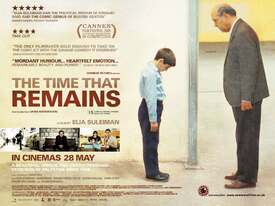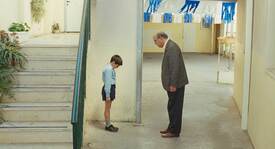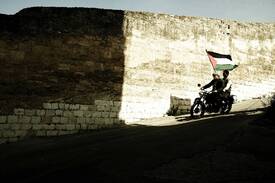A beautiful, unique, and deeply personal depiction of Palestine since 1948 from the internationally acclaimed director of Divine Intervention.
‘The Time That Remains is a semi-autobiographical film, in four episodes, about a family, my family, from 1948 until recent times.
The film is inspired by my father’s private diaries, starting from when he was a resistance fighter in 1948, and by my mother’s letters to family members who were forced to leave the country.
Combined with my intimate memories of them and with them, the film attempts to portray the daily life of those Palestinians who remained and were labelled "Israeli-Arabs", living as a minority in their own homeland.’
Elia Suleiman
Watch clips from the Cannes Film Festival Press conference, as well as an interview with Elia Suleiman
Listen to the English or French version of the Cannes Film Festival Press Conference
See the trailer in High Definition
Interview in Sight and Sound and Adania Shibli on the film
Elia Suleiman Director
Filmography Selected
Born in 1960 in Nazareth, Elia Suleiman lived in New York from 1981 to 1993. While in the United States, he directs his first two short films: Introduction to the End of an Argument and Homage by Assassination, which numerous awards.
In 1994, he settles down in Jerusalem, where the European Commission entrusts him with the mission of creating a Film and Media Department at Birzeit University. His essays and articles have been published in English, Arabic and French.
His first feature film, Chronicle of a Disappearance, won the Best First Film Prize at the 1996 Venice Film Festival. In 2002, Divine Intervention won the Jury Prize at the Festival de Cannes as well as the Best Foreign Film Prize at the European Awards in Rome. The Time that Remains (2009) is his latest film.
Often compared to Tati and Keaton, Elia Suleiman handles burlesque and sobriety with the same poetic sense.
Masterclass with Elia Suleiman on the Fabulous Picture Show
Stories My Father Tole Me - Read Full Interview with Elia Suleiman in The Guardian
As Director
2009 The Time That Remains
2007 To Each his Own Cinema (episode)
2002 Divine Intervention (Yadon ilaheyya)
1999 Cyber Palestine (short)
1997 War and Peace in Vesoul (short)
1996 Chronicle of a Disappearance (Segell ikhtifa)
1993 The Gulf War, What Next? (Harb El Khalij wa baad) (episode)
1990 Introduction to the End of an Argument
As Screenwriter
2009 The Time That Remains
2002 Divine Intervention (Yadon ilaheyya)
1999 Cyber Palestine
1996 Chronicle of a Disappearance (Segell ikhtifa)
As Actor
2009 The Time That Remains
2007 To Each his Own Cinema
2006 Bamako (dir. Abderrahmane Sissako)
2002 Divine Intervention (Yadon ilaheyya)
1993 The Gulf War, What Next? (Harb El Khalij wa baad)
CREW
Directed by Elia SULEIMAN
Screenplay Elia SULEIMAN
Producers Michael GENTILE, Elia SULEIMAN
Co-producer Hani FARSI
1st Assistant directors Jérôme BORENSTEIN, Avichai HENIG
Director of Photography Marc-André BATIGNE
Set designer Sharif WAKED
Costume designer Judy SHREWSBURY
Sound engineers Pierre MERTENS, Christian MONHEIM
Editor Véronique LANGE
Associate producers Avi KLEINBERGER, Maya SAMBAR
Production manager Jacques ROYER
Co-production NAZIRA FILMS (France)
FRANCE 3 CINEMA (France)
ARTEMIS PRODUCTIONS (Belgium)
RTBF (Belgium)
BELGACOM (Belgium)
BIM DISTRIBUZIONE (Italy)
In association with Corniche Pictures (UK)
With the participation of MBC
France 3
Canal+
TPS Star
With the support of Eurimages
Tax Shelter ING Invest
Centre du Cinéma et de l’Audiovisuel de la Communauté Française de Belgique et des Télédistributeurs Wallons
The Media Programme of the European Community
Centre National de la Cinématographie
Palestine / France 2009 35 mm colour 1 . 85 105 mins Dolby SRD
In Arabic and Hebrew
CAST
E.S Elia SULEIMAN
Fuad Saleh BAKRI
Mother 1970-80 Samar QUDHA TANUS
Mother today Shafika BAJJALI
The neighbour Tarek QUBTI
E.S as a child Zuhair Abu HANNA
E.S as a teenager Ayman ESPANIOLI
Jubran Bilal ZIDANI
Thuraya Leila MOUAMMAR
Nadia Yasmine HAJ
Anis Amer HLEHEL
Rose Nina JARJOURA
Mayor Georges KHLEIFI
It's a cool, controlled minor masterpiece, the tone detached, oblique, surreal...The Time That Remains is humanist cinema at its finest and the absence of sentimentality, the gentleness of the cynicism and the curbing of rancour are remarkable.Philip French
The Observer
Comic scenes, superbly controlled and composed in the manner of Tati and Keaton...brilliantly shot...and some tremendously engaging sight gags...a cultural and emotional resistance to the Israeli state: not rage but a defiant buoyancy of spirit, a flower in the gun barrel of oppression...There is much to enjoy: not merely its breathtaking technique, but the touching moments of gentleness and compassion...charm and wit in abundance.
Peter Bradshaw The Guardian
★★★★★
‘Suleiman deploys distinctively photographed tableaux, idiosyncratic characters and a stand-up comic's sense of timing to evoke the absurdity of the modern political situation.’
Sukhdev Sandhu, The Daily Telegraph
The Time that Remains is unquestionably Suleiman’s masterpiece
Ali Jafaar Sight and Sound
Any new film by Elia Suleiman gives cause for rejoicing...a rare and precious artist: a tragedian and a humourist in equal measure...who has the comic timing and visual flair of a Buster Keaton or Jacques Tati...The absurdity of recent Middle Eastern history – the bewildering extent to which social justice is denied to so many Palestinians - is evoked with a perfect synthesis of melancholy, rage and black wit.
Sukhdev Sandhu The Daily Telegraph
★★★★
Vivid vignettes...the slapstick whimsy and and music numbers underline the poignant follies of daily life in Palestine.
Allan Hunter The Daily Express
Elia Suleiman’s most eloquent and moving feature to date
David Jenkins Time Out
★★★★
Elia Suleiman uses deadpan humour to explore the absurd plight of Arabs in Israel...Elia Suleiman goes one step further than mere courage, using humour as a form of resistance...painting himself as a mute observer, like an Arab Jacques Tati awaiting the next enormity.
Derek Malcolm The Evening Standard
★★★★
Suleiman’s family memoir manages to combine the surreal, the satirical and the sorrowful...Suleiman’s beautifully shot film avoids overt political statements but brilliantly uses irony and droll observation to powerful effect.
Angie Errigo The Mail on Sunday
Has the precision, economy and verve of a classic silent comedy
Nicholas Barber The Independent on Sunday
Personal and political come together in Suleiman’s latest...elegant choreography and tender observations
Guardian Guide
★★★★
Marvellous...a masterly exercise in sly humour...touching, delicately observed
Edward Lawrenson The Big Issue
★★★★★
As profound and poignant as humorous and horrendous
Jeff Sawtell The Morning Star
“The other key film here (Cannes 2009) was The Time That Remains by Elia Suleiman– an eccentric memoir of his upbringing in Nazareth, all carried off in a highly composed poker-faced style recalling Jacques Tati and Buster Keaton.”
Jonathan Romney, The Independent
“Tonight’s Palme d’Or victor at Cannes is a tough call…I’d like to see The Time That Remains win because it’s very good”
Richard Brooks, The Times
★★★★
Deadpan humour, a sideways glance at conflict, and a desire to place himself in the narrative in a faux-bemused fashion that evokes Tati and Keaton is Suleiman’s singular approach to chronicling the personal ramifications of conflict in his native Palestine....the later, more emotional scenes, are particularly affecting.
Dave Calhoun
Time Out
‘Poignant and subversively funny... a deadpan delight’
Richard Corliss, TIME magazine
'Mordant humor in the face of political disaster...its exquisite balance of visual rigor and heartfelt emotion gives it remarkable, if always quiet, beauty and power.'
A. O. Scott, The New York Times
Best of “Film Comment Selects”
'A sad-eyed Buster Keaton with the skills of an ace political satirist, actor-director Elia Suleiman may be the only filmmaker bold enough to take on the Palestinian-Israeli conflict with the savage comedy it deserves.'
Joshua Rothkopf, Time Out New York
'One of the most inventive films at Cannes'
Amy Taubin, Sight and Sound
'...rich with meticulously observed, historically-grounded pathos... Though there’s a pervasive sense of elegiac hopelessness throughout the film, Suleiman consummately delivers a humanist drama that does not resort to rhetorical arguments or cruelly uses its characters as obvious foils for a blatant political agenda. Instead, his film exudes a sweeping, bittersweet kind of pathos.'
Simon Abrams, New York Press
'...a perverse triumph of darkly comic reflection.'
Andrew Schenker, Slant Magazine








